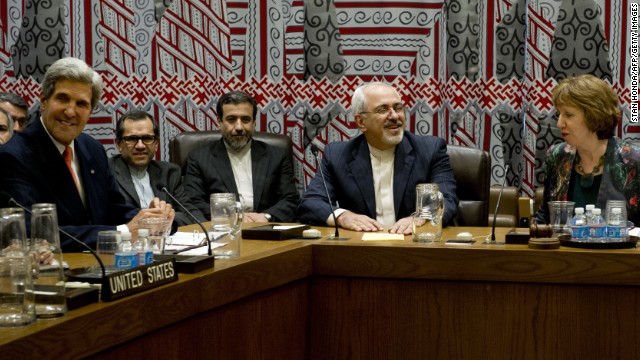
September talks included Secretary of State John Kerry, left, and Iranian Foreign Minister Javad Zarif, second from right.
- There's still work to do, British Foreign Secretary William Hague says
- Top Western diplomats rushed to Geneva earlier Friday amid rising hopes for deal
- Talks Saturday will include a meeting of John Kerry and EU foreign policy chief Catherine Ashton
Geneva, Switzerland (CNN) -- Six world powers and Iran continued talks on its nuclear program Saturday, warning that despite progress, crucial issues remain unsolved.
British Foreign Secretary William Hague said a deal aimed at slowing Iran's move toward a suspected nuclear bomb has not been finalized.
"These negotiations have made very good progress, and continue to make good progress, I think it is fair to say," Hague said. " But there are still important issues to resolve. So clearly they are not over yet. We have to give a lot of time and attention to those issues. ... And there is no fixed time for us to reach a conclusion."
There's still work to do, he said.
"The Iranian nuclear program is very extensive, it has many different aspects, and therefore any deal the world can have confidence in has to be detailed, it has to be exhaustive," he said. "It has to be quite painstakingly arrived at. It has to provide for the necessary transparency, and a different approach in Iran in the future from the past. And therefore it's not surprising that they're detailed negotiations and that they may need to go on for some time."
Top diplomats from the United States, France, Britain, Russia, China and non-nuclear-armed Germany -- a group referred to as the P5+1-- rushed to Geneva on Friday to see whether they could close the deal.
Chief Iranian negotiator, Foreign Minister Mohammad Javad Zarif, had predicted a deal was in the works.
Negotiations on Saturday will include a meeting of U.S. Secretary of State John Kerry, EU foreign policy chief Catherine Ashton and Zarif.
For years, international leaders have suspected Iran of working toward nuclear weapons, fearful of the instability such a scenario could bring to the tense Middle East.
Fears include the possibility of a pre-emptive Israeli strike that could spark a broader conflict.
Iran has denied working toward nuclear weapons, and has said it will not submit to any plan that would totally eliminate its nuclear program.
Zarif had predicted the talks could produce a deal by Friday night.
Iran has been under crippling U.N. sanctions related to its nuclear program since 2006. The United States first sanctioned Iran over its nuclear program in 2000.
Resolutions and sanctions passed by the United Nations seven years ago called on Iran to halt all enrichment activities and clarify that its nuclear facilities were being used for peaceful purposes only.
CNN's Karl Penhaul reported from Geneva. CNN's Elise Labott reported from Washington. CNN's Yousuf Basil, Andrew Carey and Jo Shelley contributed to this report.
